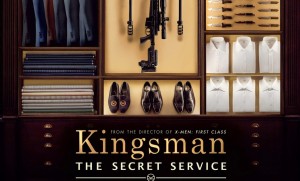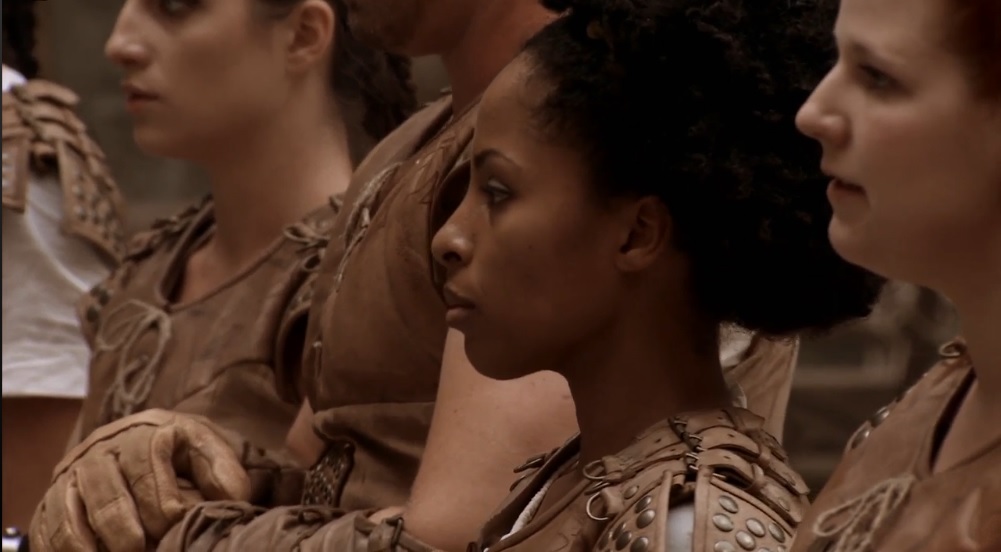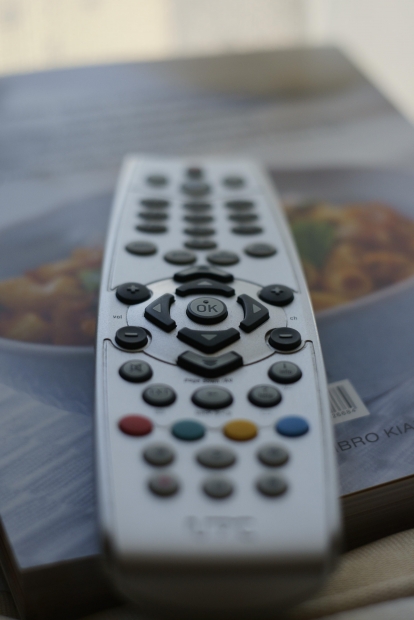“Kingsman: The Secret Service” is an entertaining balance of spy genre satire, contemporary comedy, and sincere writing. The film follows Gary ‘Eggsy’ Unwin (Taron Egerton), a lower-class former Marine-in-training who is tapped to become part of the secret Kingsman organization by current member Harry Hart (Colin Firth). The movie brilliantly exposes class warfare and explores what happens when competition heats up and the classes mix.
“Kingsman” has evoked controversy and criticism on many socio-political points, as comedies often do – but how does the movie measure up when it comes to female characters? With complicated controversy. [WARNING – SPOILERS BELOW]
“Kingsman” Female Characters:
Despite the limited glimpse of the film’s previews, female characters have a significant impact on Eggsy and his story.
Eggsy’s Mother: While Eggsy’s coming-of-age journey is partially defined by the absence of his father and the presence of Hart, his mother (and how men treat her) has an enormous impact on his life. While Eggsy’s mother (Samantha Womack) is a victim through most of the film, her situation is extremely realistic and the movie highlights the unfortunate reality that many women face, especially in less fortunate circumstances. (This is a major theme of the film, and given an acknowledgement at the end of the film, I believe it was an important and personal point for the writers.)
Eggsy understands that a good man – a gentleman – doesn’t hit his partner. He cares about his mother and his little sister. This is what makes him such a natural fit for the Kingsman.
Roxy: As a character, there’s nothing I don’t like about Roxy (Sophie Cookson) or how she’s portrayed. She’s ass-kicking and awesome. Like any realistic character, Roxy has a fear. Eggsy helps her overcome it. He doesn’t feel that she owes her for it and she doesn’t feel like she owes him anything. They’re friends. There’s no sexual tension. They don’t hook up. It’s pretty awesome. When Roxy achieves things Eggsy doesn’t, he doesn’t doubt her abilities or worthiness.
When the Kingsman candidates show up, there are two female candidates – and the women group up with Eggsy quickly. We get the sense that this is because Kingsman is a rich boys’ club. Eggsy isn’t rich and the other two aren’t boys.
Gazelle: Gazelle (Sofia Boutella) is the right-hand woman of Valentine (Samuel L. Jackson), the film’s villain. She does everything from serve food to infiltrate and assassinate. It’s also implied that she and Valentine are intimate. She’s a double amputee with fitted legs that double as blades. Although Roxy is another formidable female in “Kingsman: The Secret Service,” the film avoids the ‘designated girl fight’ trope, pitting Gazelle against Eggsy instead of Roxy. In the fight and otherwise, I don’t recall any gender-based insults thrown Gazelle’s way.
The Problematic Princess Tilde:
Princess Tilde (Hanna Alstrom) is a Scandinavian princess who dines with Valentine, Gazelle, and her own political opponent at Valentine’s compound. She refuses to agree with his plan and he imprisons her. Eggsy and the others are at some point alerted of her disappearance, and Eggsy eventually discovers her. In suave spy style, he asks her for a kiss if he opens the door, to which she responds ‘I’ll give you more than a kiss.’ Then she offers anal sex, and they then show him going into the cell with some champagne and a view of her unclothed rear.
In an EW interview, “Kingsman” director Matthew Vaughn defends the action because he intended to gender-reverse similar innuendos said by James Bond.
“I just thought it would be great to turn it on its head by having the woman say it. I actually think it’s empowering. Some bloody feminists are accusing me of being a misogynist. I’m like, ‘It couldn’t be further from the truth.’ It’s a celebration of women and the woman being empowered in a weird way in my mind, which will cause a big argument again I’m sure. It’s meant to be tongue-in-cheek and crazy,” he says in the interview.
Vaughn goes on to defend the scene by saying there are more offensive things in the film and that only some people are offended by it. He says: “Those 20 percent of people just need to lighten up a little bit. It’s about pushing boundaries and having a bit of fun. It’s not meant to be offensive, and it’s definitely not misogynist or any attack on women. That’s for sure.”
What Vaughn doesn’t see is how this scene is potentially problematic for a feminist audience for multiple reasons:
- Roxy doesn’t get some. The sexual reward is only limited to men getting said reward from women. A truly clever move would have been for Roxy to claim a sexual reward and for Eggsy to be the respectful or sexually reserved one. While I think some feminists would still have a problem with the scene in question, I wouldn’t mind it so long as a female character was exerting heroic privilege in the same way.
- It undermines the male lead. He’s treated women respectfully throughout the whole film – defending his abused mother, assisting Roxy and acting as her equal, and fighting Gazelle as the serious threat that she is. Although the encounter is consensual, he’s still taking advantage.
- The film had no misogynist overtones until that scene. Vaughn earned the trust of the audience, only to add that scene. After enjoying most of the film, it was a huge let down. I was thinking ‘wow, this is one of the coolest movies I’ve ever seen‘ until that. Then it stopped becoming a top-ten hopeful. The main character went from an example of modern chivalry to a negative stereotype.
- He’s not a woman – so he doesn’t really get to determine what is or is not misogynist. He may not have had misogynistic intentions, but he was informed that about 20% of the test audience was offended by the scene in pre-screenings. He still chose to leave the scene in. And that fact undermines the brilliance of the film…because here he is enforcing the ‘oh, you’re too sensitive’ excuse on the audience while also expecting us to accept a movie that’s telling us some people (rich/powerful) are taking advantage of the rest of us. Since I am a woman, I get to determine what empowers me – not the person creating the media. The artist does not determine what is empowering – that is for the audience to decide. I’m surprised that any creative professional with such success would not understand this point.
- It was empowering when the princess told Valentine she wasn’t interested in his plan and was imprisoned for her refusal to cooperate. She was brave without being violent – which is different from any other woman in the film. Her actions in the later scene mitigated that empowerment.
- The violence and other ‘potentially offensive’ moments in the film were unlike those in “The Interview” and other movies. It was cartoony. Even the real slices and shots were not gory. The inclusion or absence of other potentially offensive elements has no bearing on whether the audience is justified in finding one or more other points offensive.
- Unintentional and casual misogyny is still misogyny.
Other arguments I have heard in favor of the movie’s anal sex scene include:
This is what you should expect from Vaughn/Millar! Oh, shoot…I wasn’t aware that only people who were familiar with these creators should go to see the movie. Here I was thinking they were marketing it beyond that audience. Next time I will only go see a movie if I am familiar with the creators’ work and I won’t try anything new! — I say this sarcastically, but I fear that is actually the effect these types of comments will have on me. I’ll just go to the movies to see Marvel films and nothing else because I know I’ll like them.
Why are you trying to censor things?! To criticize is not to censor. As the film itself indicates – self-improvement is the real goal. The film pushes boundaries too – as it should. While I agree that it’s more constructive to promote and discuss films with positive representations of women, it is still necessary to think critically about movies – especially comedies and satires which say a lot about our culture. And if this film is saying that the sexual reward for traditionally masculine and heroic behavior is acceptable for a male hero and not a female one, then it’s important to discuss it. If Vaughn thinks it’s acceptable and some of his audience disagrees, then the movie’s doing what it should do – it’s bringing the issue to the forefront and it should be discussed. Plus, I bet most of the people who didn’t have strong feelings about the anal sex scene either didn’t love it or wouldn’t have minded its omission.
But it shows a commoner giving it to royalty ‘in the ass’ and stuff: I get the metaphor – but the thing is, Princess Tilde is a member of the royalty who isn’t looking to destroy the world – that’s why she was imprisoned. Also, there are other options for this metaphor if it really must be shown. Maybe the weapon that pierced Valentine could have gone through his butt instead of his heart, for example.
It was co-written by a woman: What’s written in the script doesn’t always make it into the final cut. That’s up to Jane Goldman’s co-writer, Matthew Vaughn, who is, of course, also the director. (It’s also not the first time Goldman would have to deal with that kind of thing.)
Kingsman Values and Language:
Kingsman values, as Hart describes them, are about true gentlemanly behavior. A man’s suit is his armor and observes conventional manners, etc. The stodgier traditions, as you’ll see in the film, are intentionally discarded by Hart, Eggsy, Merlin, and Roxy. Although Hart uses traditionally male-oriented language, none of the qualities he ascribes to a Kingsman would exclude women.
I was grateful for a “50 Shades of Grey” alternative when it came to movie selection this weekend, but the second or third time Eggsy called Roxy “good girl,” I was wondering if I’d accidentally wandered into a “50 Shades” screening. Ugh. He could have said “well done” or “great job” as a means of praise after encouragement.
When Eggsy is referred to as a boy, it’s always negative, or by villains. When Eggsy refers to Roxy as a girl, it’s not intended to be an insult – but it should feel like one. Why the difference due to gender? Roxy should have pointed it out in a later scene. We know Eggsy isn’t supposed to be disrespectful of women in the movie, and this phrase takes away from how awesome his character is supposed to be. It’s a minor detail (unlike the aforementioned Tilde butt sex debacle) and it doesn’t make or break the film.
Clothing:
All characters in the movie wear sensible and utilitarian clothes. With the suit being armor (it’s actually bulletproof and also makes a decent metaphor), the aesthetic of clothing is important in the film. In one scene, we see the characters underwater in their nightclothes. The guys are shirtless with pajama pants on (kind of clingy, might I add) and the women seem to be in tank tops and pajama pants. The women’s clothes are white, so I thought it was going to be a wet tee shirt sort of scene, but it wasn’t at all. The shots of the women were not overly revealing.
Gazelle’s fitted with formal, modest, practical attire. She can enter combat in these clothes or attend a formal function.
What’s Missing:
Roxy’s Suit of Armor…Kind Of: Roxy’s suit of armor isn’t missing, really. She actually gets to wear a high-tech space suit to complete a major quest – and that’s all extremely awesome. Afterwards, she’s speaking with Eggsy via audio and he’s feeling pretty mighty in his suit (as he should) and asking her if she’s been fitted with one. He’s not being facetious – never does Eggsy treat her as anything but an equal – and she responds that she hasn’t gotten a suit yet. The thing is, she had just been wearing a suit that empowered her to save the world in outer space.
It would have been nice to see her in a Kingsman suit, but it’s also pretty awesome that she was fully respected as a Kingsman without one. It says a lot about her character in every sense of the word.
Roxy’s Sexual Conquest: It’s not about the male character’s ‘reward’ sending a certain message, but the inequity. While Roxy’s gender isn’t questioned by even Arthur, she reaps different rewards than Eggsy. Eggsy’s entitlement of sexual reward might be excused (especially since the film spoofs the spy genre) had Roxy gotten a similar reward. Where was her conquest? Maybe she could have had her pick of any beefcake in a pub. It would have just taken a few seconds of film. Especially interesting is the moniker she inherits – Roxy is Lancelot, but she doesn’t get to romance anyone. I’m glad she’s focused on her duty, but if Eggsy gets sex as an entitled reward for heroic deeds, so should she.
For a woman, coming of age also includes sexual maturity. However, that’s not really a thing you’re supposed to conquer in these types of films, so I guess the writers just got lazy and failed to include it.
Heroes of Color: Whoops, all of the people of color in this movie are villains. All of the potential Kingsman are white. It’s hard to accept a film that criticizes bigotry so dramatically when none of the good guys are people of color.
Overall:
This movie would have been amazing without the Eggsy/Tilde scene. A wider audience might have enjoyed it. They shouldn’t make movies with Colin Firth (I mean let’s be real, he’s sexy and classy and lures the ladies in) only to say that feminists are being too sensitive. There’s a big gap in the comedy market – there are soppy comedies ‘for women’ and then there are movies that nearly achieve success with our demographic – but fall short because the audience is ‘too sensitive.’
“Kingsman” was so close to being perfectly awesome. It led me on with Colin Firth, feminism, subversion, and witty dialogue…then disappointed me with one remarkably unforgivable scene.
It was as simple as leaving one scene out or letting Roxy hump a beefcake after a long day in space/battle. Yes, Mr. Vaughn, it really would have been that easy.
Have you seen “Kingsman: The Secret Service?” Post your thoughts in the comments below!

![Feminist Review of ‘Kingsman: The Secret Service’ [Contains Spoilers]](https://geekinitiative.com/wp-content/uploads/2015/02/kingsmanposter.jpg)




